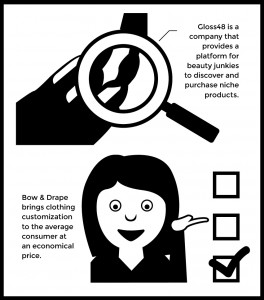As large fashion retailers such as Urban Outfitters and The Gap, Inc. report a continued trend of negative retail sales and a fall in stock prices, the fashion and beauty industries are in a position to welcome new players in the market.

With the familiarity of a brick and mortar, the unique offerings of a boutique and the targeted analytics and technology of a modern startup, Boston-founded companies Bow & Drape, Gloss48 and Nineteenth Amendment are disrupting the status quo by changing the way consumers interact with beauty and fashion brands.
The companies are solving two issues in the fashion and beauty industries: the burden on consumers in the search for customizable and high-end products and the difficulty designers face when trying to break into a cutthroat industry.
Bow & Drape, an online women’s clothing boutique that raised $1.2 million in seed funding in January, brings out-of-reach customization to the average consumer and the manufacturing of personalized clothing at an economical price.
Bow & Drape CEO Aubrie Pagano said she created the company to fill a void in affordable, customized women’s fashion. The company produces custom clothing to order on par with retail pricing, making an exclusive piece of clothing as viable as something off the rack.
Pagano, who had always sewn her own clothes, said she recalls crafting her pants for an upscale party in New York, a celebration that demanded something special.
“I bought what looked like a Salvador Dalí print and made these wild pants. Everybody loved them,” she said. “That’s when I thought, ‘If I had something more unique, I’d feel more confident about my own style.’”
Pagano said the company has evolved since its inception, taking cues from consumers to determine product offerings. Bow & Drape, originally offering solely dress customization, eventually expanded to other wardrobe pieces such as sweatshirts, T-shirts and tote bags.
“What we realized is that girls who were really excited about customization had a ton of personality. Just customizing a dress doesn’t allow her the full weight to express herself,” Pagano said.
With its expansion to different product offerings, Bow & Drape has seen its brand develop customer loyalty, including the loyalty of some celebrities and reality television stars, she said.
“Rather than buying off the rack, the choice can be, ‘Do I want to buy off the rack or customize?’ she said. “It should be a choice for someone.”
While some customers seek customization, others seek novelty. Gloss48, a company that provides a platform for beauty junkies to discover and purchase niche products, brings small brands to the consumer market.
“Frequently, these brands are sole proprietors that sell an amazing product,” said Laura Bronner, co-founder of Gloss48. “Then it sort of falls off a cliff due to a lack of marketing budget or any type of distribution.”
Gloss48 is not Bronner’s first foray into the beauty industry. Previously, she worked at MiniLuxe, a nail and waxing salon chain that grew out of the Boston area and recently received funding to expand its services nationwide. Located across from massive beauty retailer Sephora, MiniLuxe had to try and offer unique brands in order to compete, Bronner said. This concept carried over to Gloss48.
The Gloss48 site curates indie brands and products, featuring the launch of a different brand on its site every day. During these launch periods, the product is offered at a promotional price for the first seven days. The rest of the brands are available for purchase at regular prices using a marketplace model similar to that of Amazon.
“In the seven-day promotion period, we tell their [the brand’s] story and give them social media love,” Bronner said.
She said the YouTube community has been extremely receptive to Gloss48, often contacting the company with suggestions on new brands and products to feature.
“From a consumer standpoint, our goal is to become the place women go to discover and shop exciting beauty,” she said. “And from a brand perspective, we want to be the first company they think of when they launch a new product.”
Like Gloss48, Nineteenth Amendment aims to bring lesser-known brands to the mainstream market by connecting new designers with prospective customers. Amanda Curtis, CEO of Nineteenth Amendment, said her company was built off problems she witnessed while attempting to break into the fashion industry.
Curtis, a 2009 Boston University College of Communication graduate and 2010 graduate of Parsons The New School for Design in New York, said after her nascent brand made it to the finals of New York Fashion Week and still could not gain traction, she knew there was a problem.
“The issue in breaking into the fashion industry is brand,” Curtis said. “This hasn’t changed in the past 110 years, but now there’s the Internet and a better way of doing things. Nineteenth Amendment is a way for these brands to get to market and reach customers directly.”
The platform of the website brings on fresh designers and allows them to upload their designs, which can then be browsed by customers in a 45-day window. When that period ends, designers who have received at least 10 orders will be put into production, and the customer will receive the garment at wholesale price. These designers will also then have the opportunity to sell their garments at retail outlets.
Nineteenth Amendment also provides designers with a product lifecycle management system built to connect smaller brands to manufacturers, as well as a data dashboard with analytics on their customers and their brand.
Curtis said fashion is a two-sided marketplace, and she hopes Nineteenth Amendment will be the one-stop shop for designers to launch and for consumers to discover new talent in the fashion world.
“It [the 19th Amendment] gave everyone a voice in democracy,” she said. “We see ourselves giving everyone a voice in fashion – designers, consumers, manufacturers [and] retailers.”














